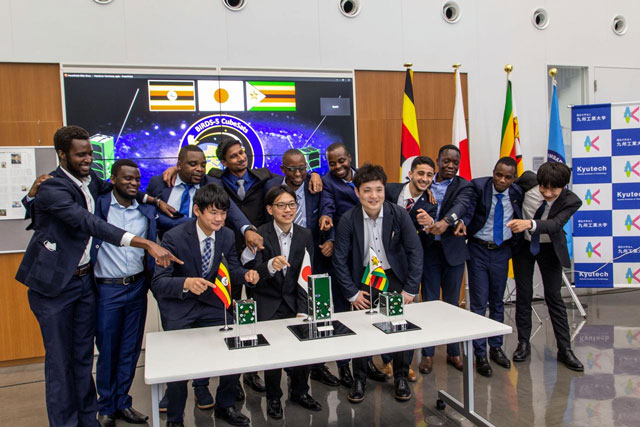Zimbabwe and Uganda launched satellites into space on 7 November as beneficiaries of the Joint Global Multi-Nation BIRDS Satellite project, BIRDS-5 specifically, which has been a collaborative project involving these countries, the Japan Aerospace Exploration Agency (JAXA) and the Kyushu Institute of Technology (Kyutech).
The project started in 2015 and has included the secondment of a group of students, the bulk of them from Africa, to work with Japanese peers at Kyutech. The students are from Morocco, Sudan, Trinidad and Tobago, Uganda and Zimbabwe.
The BIRDS-5 project provides students from developing nations with limited involvement in space sciences with hands-on experience in satellite development, laying a foundation for similar space technology projects in their home countries that ultimately could lead to sustainable space programmes there.
A developing industry
Students from participating nations enrol in space engineering at the Graduate School of Engineering at Kyutech as masters or doctoral degree students to execute this project.
In an interview with University World News, Chiedza Banda, the president of the Zimbabwean Students for the Exploration and Development of Space (SEDS-Zimbabwe) said that, after this development, Zimbabwe has to prioritise space studies.
“As a nation, this milestone shows that an interest in space is not just pie in the sky for young boys and girls. If you are interested in the stars, rockets and satellites, we can then aim for those careers without fear and knowing we will be pioneers in the Zimbabwean space industry,” she said.
“We have Zimbabweans working in other countries or who would have wanted to work in the space industry but saw no future,” said Banda, who is also the Space Generation Advisory Council National Point of Contact for Zimbabwe.
“So, from here, the country has to work on developing the industry. As you saw during the launch, the cube sat was just a small part of the mission. We need rocket engineering training; we need launching pads and so forth – so we need to grow the industry.”
Banda said another aspect Zimbabwe has to look into is making laws that advance its space interests and creating an economic environment that will boost the private space sector.
“The development means that, as students and young professionals interested in the industry, we can now focus our energy on building careers in Zimbabwe instead of the brain drain that was happening. Then, in terms of Zimbabwe, it’s a step in the right direction as we will have an understanding of what we gain from space – that is, the data obtained can be used for weather forecasting, GPS and satellite imaging as well as telecommunications,” she added.
To buttress Banda’s point on the need for space studies, in an interview with University World News last year, Ruvimbo Samanga, a Zimbabwean space lawyer and policy analyst, said Africa is lagging behind when it comes to space activities and the root cause is a lack of space higher education in many countries on the continent.
She said African nations have not embraced space education, despite the sector’s significant developmental power. In fact, only a handful of countries, South Africa included, offer higher education space studies in a broader context, she added.
“The first African astronaut was from South Africa but, since then, there has not been much movement. The African space industry is really just satellite-based, which is the most primary and basic node of the space industry. There are many nodes of the space industry that can be tapped into,” she said.
Mission completed
In an interview with the state-run The Chronicle newspaper, Higher and Tertiary Education, Innovation, Science and Technology Development Permanent Secretary Professor Fanuel Tagwira said that, due to a lack of adequate space studies in Zimbabwe, the launch of the satellite was made possible after the African country sent three students to Japan for their studies.
“It [the launch] is significant and what is more significant for us is that this particular satellite has been developed by our own people undergoing training at Kyushu Institute of Technology,” Tagwira was quoted as saying.
“We sent three Zimbabweans to Japan to go and learn about satellite technology, one of them at PhD level and two at masters level. Part of their study was to produce a satellite for the country,” he added.
University World News







